We traveled to the historic Rocky Mount Mills in North Carolina to collect local family photographs and stories with our local partner UNC-TV for our new PBS television series, Family Pictures USA. Through our photo-shares, we uncovered fascinating stories about the people and places that make up their community.
We met one family – the Ausby family – whose family album revealed strengths and challenges, a journey from slavery to freedom that is defined by perseverance and determination. The stories behind these photos had even motivated the family historian, Jewel Ausby Lowe, to piece together family connections in Halifax County and beyond.

Jewel shares her family story with us.
“My name is Jewel Ausby Lowe and my family story starts with slavery in Halifax County, North Carolina. My ancestors were owned by a White family named the Ousbys. Thomas Ousby was born in Virginia around 1784. He married Sarah Powell in 1818 and, by 1830, they were living in Halifax.
According to various slave schedules from 1850, Thomas owned about 32 slaves. When and where exactly they purchased my ancestors is unknown. He and Sarah died around 1860, but their three sons, AJ, James and William, were known to have owned slaves as well. AJ owned 8 slaves; James owned 27 slaves (he was one of the largest slave owners in Halifax County at that time) and William owned 9 slaves. What I find interesting is that both James and William, as well as James’ wife and daughter, are listed as Mulatto.
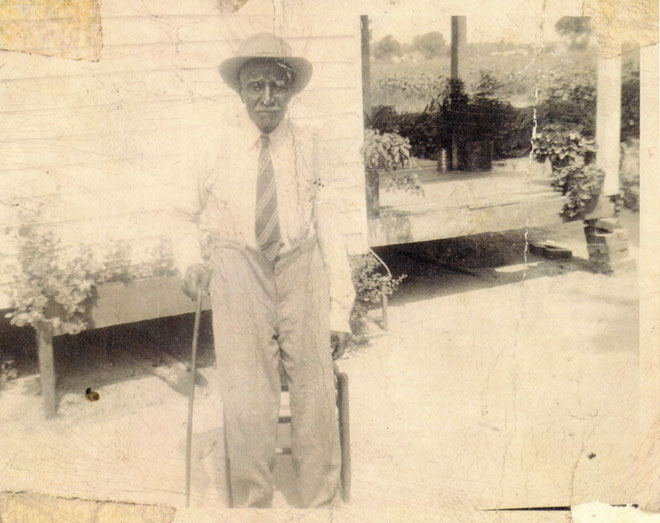
James Wallace, born 1848. Courtesy of Jewel Ausby Lowe.
This is a picture of my 2nd great grandfather, James Wallace, who was born in 1848. It shows a tired man, shrunken by life’s harsh treatment and left to survive and provide in a country with a system of government that did not allow him freedom in anyway. All of my ancestors who were brought to this country or born here before 1861 were solely thought of as property.
They were born with the sole purpose of putting money into the pockets of those who had stripped them of all physical, mental, and emotional needs. I look at the face of my great great grandfather and, knowing that he was considered nothing but property, comparable to livestock, brings tears to my eyes. I find it ironic that my ancestors lived in the county where the Halifax Resolves, a collection of documents that pushed for American independence, were written.
Thomas and Sarah Ousby died a year before the American Civil War began. After it ended in 1865, most southern states passed ‘black code’ laws. This was an attempt to allow former slave owners to retain their laborers as ‘hired help’, tenants or sharecroppers. My ancestors had a decision to make – either they could stay with their former master and work for wages, or try to make it on their own.

Copy of 1870 census records with listing of Ausby family members. Courtesy of Jewel Ausby Lowe.
My 3rd great grandfather, Geo Ausby, was born about 1830. Since slaves were not listed in the census records by name until 1870 – only by age, birth year and gender – no one knew who Geo’s parents were. They could have been sold to another slave owner or, even worse: killed. What really hits the heart is that, except for the last three, all of Geo’s children were born into slavery.
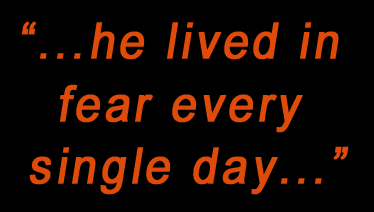
As a parent myself, I couldn’t imagine how he must have felt having children that could be taken away and sold at any time, torn from the family. He lived in fear every single day of losing a child. According to the census, by 1870 Geo was 40 years old living with his wife, Annie, and eight children, on the property of their ex-slave owner working as a farmer. Many of Geo’s descendants would be farmers and or sharecroppers for decades.
These pictures of Albert and Lon, sons of Edmond Ausby, do not accurately depict life as a farmer. They do not show the hard calluses on their hands from the plowing fields year round. Nor does the picture of Lena show who she really was – a woman stuck in the kitchen feeding her ten children and taking care of her home.
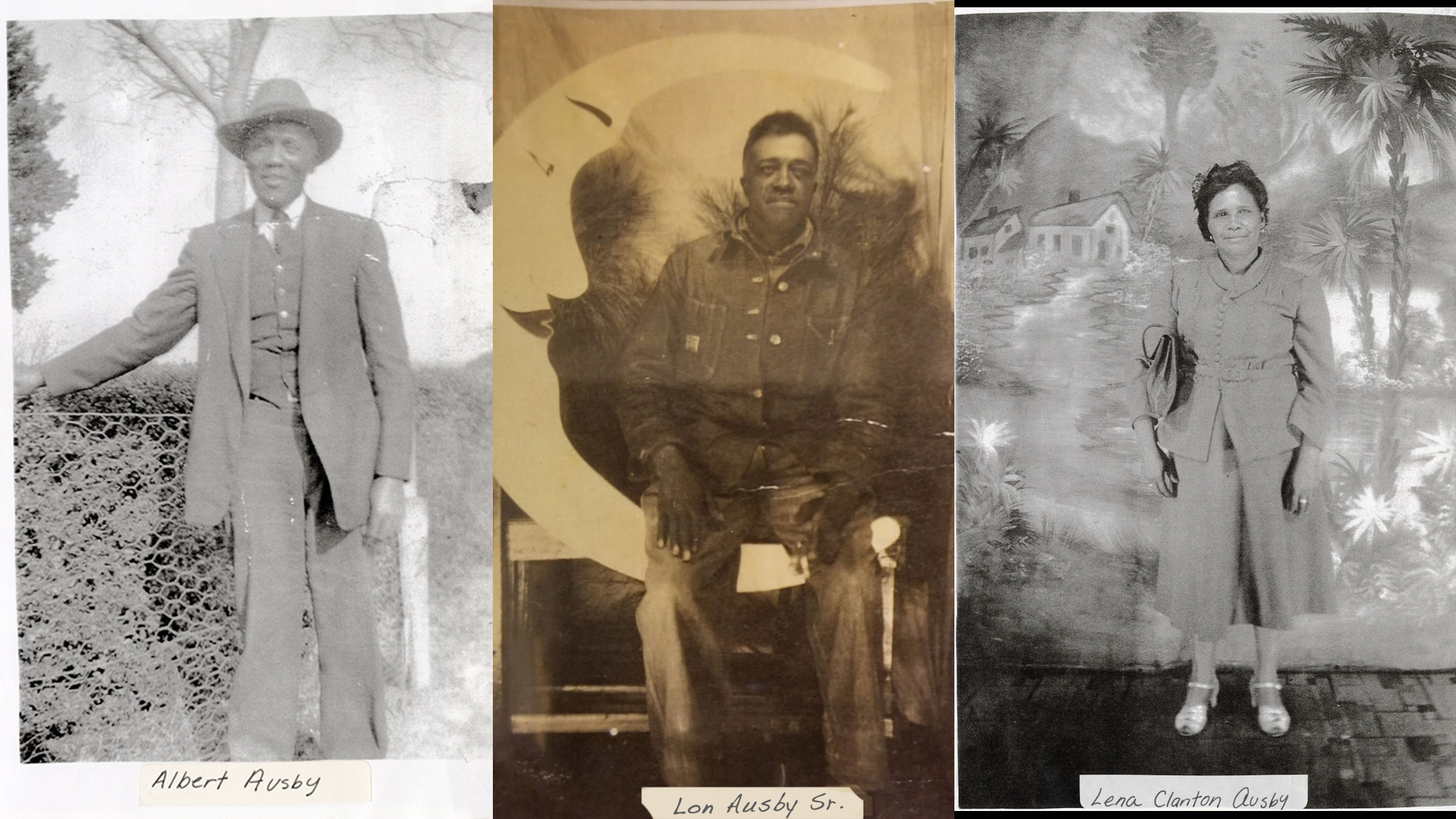
(Left) Great grandfather Albert Ausby, born 1885; (Center) Lon Ausby Sr., Albert’s brother, born 1893; (Right) Great grandmother Lena Clanton Ausby, born 1862. Courtesy of Jewel Ausby Lowe.

However, by knowing my family’s history through records and family stories, I can look at these pictures and see much more than what is depicted. Edmond was only six years old when slavery ended in North Carolina. Although slavery had ended, the slave mentality was still very much prevalent, not just among ex-slave owners and the white community, but even among the now free black slaves in Halifax County. Life was still a struggle for them and nothing came easy.
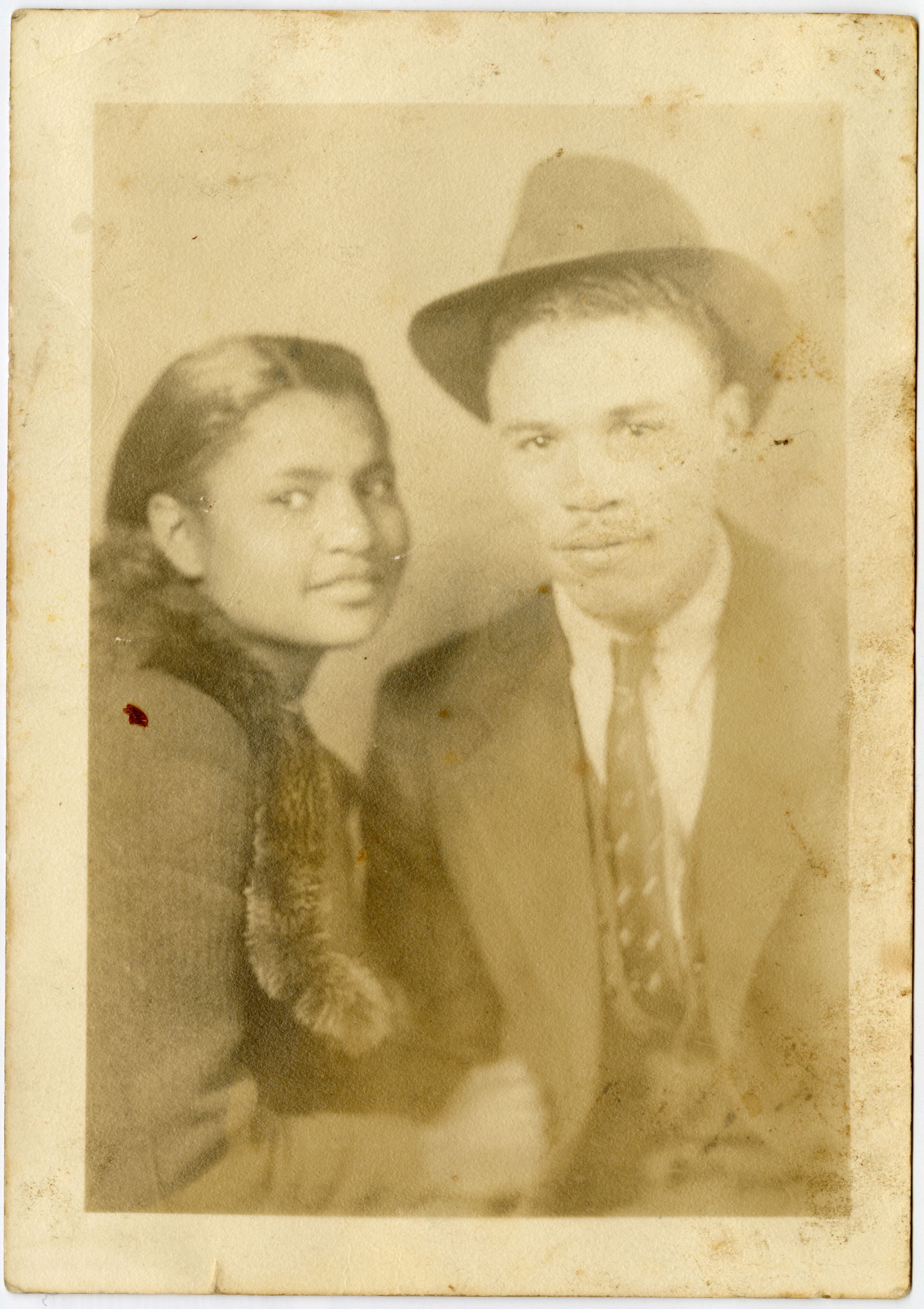
Grandfather John Edmond Ausby was, born 1913. Grandmother Bessie Mae Wallace Ausby, born 1915. Courtesy of Jewel Ausby Lowe.
My grandfather, John, was a hard working farmer. He and my grandmother lived off the land and made what little money they could by farming and sharecropping, in addition to working at the sawmill. My grandfather would always check the newspaper to see if he could afford a house or land in the area, but everything was always too expensive.
One day while reading the paper, he noticed that the last Ousby that owned his grandfather, Edmond, had died. Though my grandfather had known the family for many years, he never allowed my aunts and uncles to meet them. He kept that painful reason to himself.
My grandparents’ lives were filled with the harsh realities of what slavery had done to the mindset of their families. Although they were the second generation born free, the effects of slavery still trickled down in terms of how they were treated, not only by white citizens of the town, but by certain family members as well.
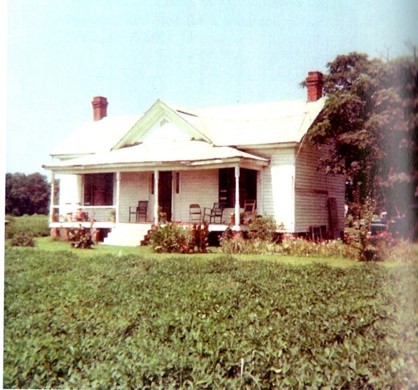
The Farm – my grandparents last home and property in Weldon, NC; taken in 1965. Courtesy of Jewel Ausby Lowe.
My grandfather had built homes for his family only to have them taken away simply because he did not own the land. My grandparents would have to uproot and move their family about three times before finally being able to buy land for themselves.
Though my grandmother was to inherit 22 acres of land and a house, my grandparents would have to come up with over $9,000 to get property that was supposed to be theirs anyway. They ended up moving to an area in Halifax County, away from the comfort of family and friends that they had known all of their lives. For grandmother, however, this meant returning to a house she had lived in when she was five years old.
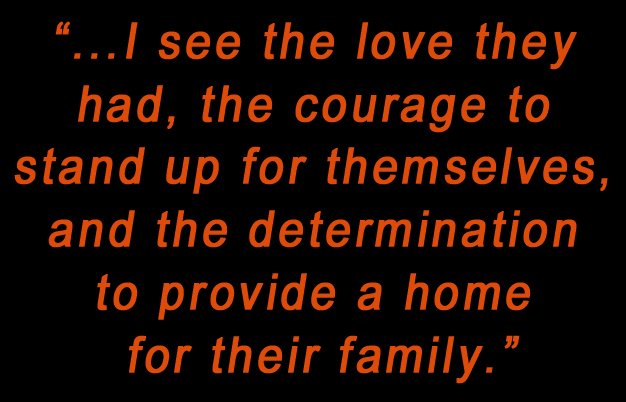 My grandparent’s struggles are told in a book my aunt wrote called A Step Back In Time. I love the perseverance they both possessed. While I have memories of my grandparents from when I was growing up, looking at pictures of them from their youth, I see the love they had for family, the courage to stand up for themselves, and the determination to provide a home for their family.
My grandparent’s struggles are told in a book my aunt wrote called A Step Back In Time. I love the perseverance they both possessed. While I have memories of my grandparents from when I was growing up, looking at pictures of them from their youth, I see the love they had for family, the courage to stand up for themselves, and the determination to provide a home for their family.
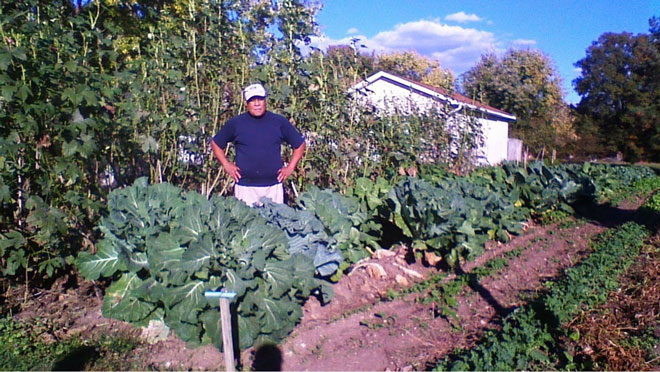
Father Julian Ausby Sr. showing off produce from his garden. Courtesy of Jewel Ausby Lowe.
And they did! I remember visiting the farm and enjoying my grandfather’s garden – cucumbers, peanuts, tomatoes, cabbages, greens and beans of all sorts. I especially loved seeing the hogs, cows and running from the bulls. My grandmother had her chicken coup close to the house, and we would have to go get the eggs and run from the hens who were chasing us. We would pick fruit off of the trees and eat pecans, washing it all down with ice cold water from the well.
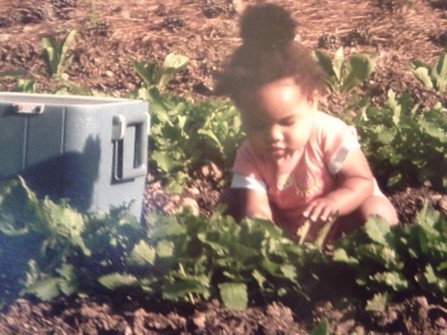
M youngest daughter Ayanna Lowe in my father’s garden. Courtesy of Jewel Ausby Lowe.
While I remember all of these fun memories from my childhood, as an adult I now understand the difficulties my father and his siblings endured as children to maintain the farm. But as mentioned in my aunt’s book, it was all worth it to not have to worry about having to pack up and keep moving from place to place ever again. Grandma Bessie finally found a place for her flowers to grow permanently.
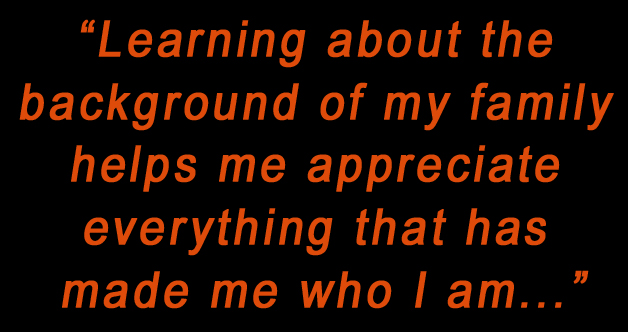
Now I can appreciate the mental and emotional struggles that my family endured. Life was hard. My ancestors were tortured and stripped of everything that we today take for granted. Clothes, food, water… family! Regardless, they were able to make a way for themselves.
My grandparents were finally able to have a bed to lay in and not worry if or when they would have to pack up and leave. They taught their children how to endure and to be hard workers. Many of my uncles and aunts would later own their own businesses and some would become teachers in the school system and colleges. Going to visit the farm isn’t the same anymore. I often stand on top of that hill looking around and thinking about what my ancestors went through. It is somber to know that, when they came to this country, they had no idea that their descendants would have the courage to speak about their story.

On top of the hill on my grandparent’s farm in Weldon, NC where they are buried, 2017. Courtesy of Jewel Ausby Lowe.
Learning about the background of my family helps me to appreciate everything that has made me who I am, and allows me to appreciate each person in my family as an individual in the story that is us.”

Jewel Ausby Lowe is an amateur genealogist and has been working on her family tree for over 20 years. Through her research she has been able to compile a list of over 2000 family members, 5 family lines of Ausbys from Georgia, Virginia, Maryland, Alabama and Texas as well as being able to introduce long lost family members to one another. She plans on implementing Family Pictures USA model of family stories and pictures at her family reunion this year where they will be talking about 189 years of family history.
We also discovered that Jewel Ausby Lowe and her mother Nannette Ausby both work at UNC-TV as public communication specialists for Children’s Media and Educational services!
To see more photos from our photo-sharing event at the
Rocky Mount Mills, click here!
You can also share your photos with us on social media using hashtag #1World1Family to be
a part of the Family Pictures USA family album.

Hi Jewel,
I loved reading your story and seeing the photographs. I’ve been working on my family geneology for over 30 years! I’m also from Halifax County. I’d love to connect with you to share stories of free blacks and slaves that were such a part of the rich history of this county!
Peace,
I’m so glad that I found this site. I’m currently working to preserve photos from my side of the family. I’m the only heir of my motger’s parents.
I want to make this a personal digital experience with an outer context of American and world history for my children.. I NEED HELP! LOL. Would someone be able to contact me for idea guidance?
I have been checking out some of your stories and i can claim pretty good stuff. I will make sure to bookmark your site. Alfonzo Provance